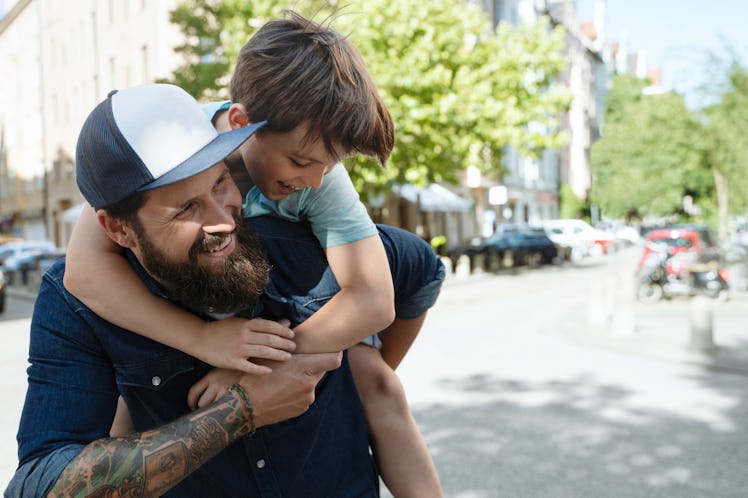Kids Don’t Trust Men With Beards, Study Says
New research shows that kids are generally wary of men with facial hair. Is it time for a clean shave?

Beards have become an accessory to fatherhood that is as ubiquitous as an IPA or tactical diaper bag. But dads debating whether to beard or not to beard might want to consider that their kid finds them repulsive, according to new research. The findings sound like they’ve been commissioned by a razor or shaving cream company, but they’re from a legitimate study of hundreds of children of all ages, published in the journal Evolution and Human Behavior. So even if you love your beard and it fulfills your spouse’s wildest lumberjack fantasies, data suggests that your baby is probably going to hate it enough for the whole family.
Scientists already know that beards convey certain messages of masculinity to different people and different times, depending on cultural norms about facial hair. For instance, women are more likely to see bearded men as better potential fathers. Other adults in general tend to see men with beards as stronger, more dominant, and occasionally angrier and more aggressive. As for what children think, University of Queensland psychologist Nicole Nelson, Ph.D., and her team recruited 470 kids ages 2 to 17 to figure it out.
The researchers showed the children a series of photos of 164 different men ages 18 to 22, specifically side-by-side pictures of the same man with and without a beard. Then they asked the kids to judge the men on a series of traits, such as dominance, age, attractiveness, parenting ability, and other qualities. Young children found beards overwhelmingly unattractive, and this only got worse until children hit puberty.
“As early as 1 year 9 months, they dislike beards, and kids, as they got older, up to about 13 years, continue to dislike beards even more,” Nelson told NPR.
Once kids hit puberty, their facial hair preferences started to shift closer to adults, who find facial hair more appealing. The one exception was that children with bearded dads did not have as harsh views about facial hair. And like adults, kids saw beards as a symbol of manliness in general.
But there’s something about that dominance that young children are instinctively put off by. “The understanding that beards are linked to strength is there very early, but they don’t seem to trust beards at all,” Nelson said.
The data echoes past studies, in which kids discussed a story of a magical island and a series of challenges. When children were asked to pick either bearded or non-bearded men to help with various obstacles, they tended to pick men with beards for fighting dragons, pushing boulders, and other feats of strength, but clean-shaven men for tasks that involved trustworthiness, like hiding a treasure map.
Social scientists aren’t sure why children feel this way, but it’s reasonable to speculate that their own safety and survival may have something to do with them being wary of men who seem stronger and more aggressive. Still, more research needs to be done to replicate these findings and figure out the motivations behind them.
But for bearded dads, kids’ opinions are unfortunately clear. Your wife may love it, your children may grow to tolerate it, and their friends might even enlist you to kill a spider here and there. But for the most part, children kind of hate your hairy face.
“I think it’s a good move if you want to kind of boost your manliness — if you want to look a little more dominant, you want to look a little bit older,” Nelson added. “Those things come along with children being slightly afraid of you. If you want to chat with children, you might not want a beard.”
This article was originally published on